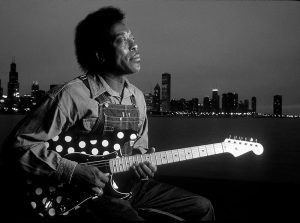Delta blues musician Sam Carr, at home in Lula, Miss.
When the world stopped, Gail Mooney started her project documenting blues musicians from the Mississippi Delta region. “I started it at the worst time you could,” she said, two weeks after 9/11.
Ms. Mooney was taking photos for National Geographic Traveler magazine at the time. While on shoots in cities like Chicago and Memphis, she began to get into the blues scene. “I started gravitating to it as part of the story, and when I had off time at night, I would go [to the clubs] because I loved the feeling of the music and the people playing the music,” she said. “It just resonated with me. At the same time, I was getting into video, and I thought that I would love to do a story about it, not so much the music, but more about the birthplace of the music, which is the Mississippi Delta region.”
Her exhibit, the “Delta Blues Musicians Project,” opens at 51art Gallery on the Beach Road extension in Vineyard Haven with a reception on July 13.
At the beginning of the project, Ms. Mooney said, “Some of these old guys had been burned by record companies who took advantage of their lack of business acumen. If that had happened in their life, or other people had taken advantage of them, then they weren’t so cordial. It came down to how much money they were going to get. Other people, like Sam Carr, spent the entire afternoon with me, and was wonderful, so it really ran the gamut. Just like people run the gamut. When I finally got there, it wasn’t a problem, but when you first approach people and it’s just an idea, it’s the hardest time. Once you have something to show for it, or somebody else who you’ve interviewed, it becomes easier.”

The project included film and photography. “I would grab whatever they gave me for the interviews and the photographs,” said Ms. Mooney. “Then I would usually catch up when I was getting imagery of the Delta and going down to the blues festivals, which would happen in late summer and early fall. I would do candid shooting when they were on stage. You got what people were willing to give you. Once you got rolling in conversation, the half an hour they wanted to give you usually turned into one or two.”
The portraits of the artists showcase vibrant personalities. Sam Carr is pictured leaning on his mailbox with his drumsticks in hand and a hint of a smile. Photos of the surrounding area, the musicians’ hometowns and other places within the Mississippi Delta region, give off a different feeling. There’s an empty parking lot in front of a blues mural, a bent stop sign alongside a dirt road, a shack in the middle of an empty field; it feels unvarnished.
Ms. Mooney traveled down South to interview the men behind the music. “It was a lot about their personal lives, especially growing up in the South, because that was my thrust. It wasn’t really focusing on what gigs they played and who was a sideman for who, although that came up,” she said. “[Sam Carr] talked about when he was growing up, how difficult it was for him being black in the ’50s and going to these clubs and not being allowed in the front door, or having to stay at a motel very far away because of the times. Out of all of the people I photographed — keep in mind, 17 years ago the youngest one was in his 70s; they’re almost all gone now. I wanted to capture their story before they couldn’t tell it anymore.”
Sam Carr was a blues drummer and a member of the Jelly Roll Kings. He died in 2009. In his interview with Ms. Mooney, he said, “I lived a rich man’s life in poor man’s shoes.” That line became his epitaph, and was displayed alongside his portrait in the Senate building rotunda in Washington, D.C., in an exhibit by the Copyright Alliance.
“I thought, ‘Wow, Sam would have been so proud to know that his portrait was in the nation’s capital,’” said Ms. Mooney.
Ms. Mooney spent countless hours with these men, documenting their lives. “They weren’t educated men,” she said. “They didn’t give me a lot of spin; instead, they told me how it was.”
The portraits and other stills from the “Delta Blues Musicians Project” will be on display at 51 Art Gallery, opening on July 13 with a reception on that day from 6 to 7:30 pm. They will hang until August 3.




